Wax like substance secret - Study guides, Class notes & Summaries
Looking for the best study guides, study notes and summaries about Wax like substance secret? On this page you'll find 39 study documents about Wax like substance secret.
Page 4 out of 39 results
Sort by
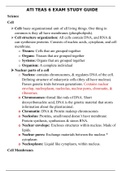
-
ATI TEAS 6 EXAM STUDY GUIDE 2020/2021
- Exam (elaborations) • 27 pages • 2021
- Available in package deal
-
- $17.49
- + learn more
ATI TEAS 6 EXAM STUDY GUIDE Science Cell Cell: basic organizational unit of all living things. One thing in common is they all have membranes (phospholipids). Cell structure organization: All cells contain DNA, and RNA & can synthesize proteins. Consists of nucleic acids, cytoplasm, and cell membrane. o Tissues: Cells that are grouped together o Organs: Tissues that are grouped together o Systems: Organs that are grouped together o Organism: A complete individual Nuclea...

-
ATI TEAS 6 SCIENCE EXAM STUDY GUIDE done
- Other • 27 pages • 2022
-
- $15.49
- + learn more
ATI TEAS 6 SCIENCE EXAM STUDY GUIDE done ATI TEAS 6 SCIENCE EXAM STUDY GUIDE Science Cell Cell: basic organizational unit of all living things. One thing in common is they all have membranes (phospholipids). Cell structure organization: All cells contain DNA, and RNA & can synthesize proteins. Consists of nucleic acids, cytoplasm, and cell membrane. o Tissues: Cells that are grouped together o Organs: Tissues that are grouped together o Systems: Organs that are grouped toget...
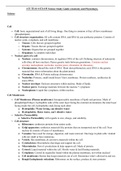
-
ati-teas-6-exam-science-study-guide-anatomy-and-physiology
- Other • 18 pages • 2022
-
- $14.49
- + learn more
ati-teas-6-exam-science-study-guide-anatomy-and-physiology ATI TEAS 6 EXAM S cience Study Guide (Anatomy and Physiology). Science Cell Cell: basic organizational unit of all living things. One thing in common is they all have membranes (phospholipids). Cell structure organization: All cells contain DNA, and RNA & can synthesize proteins. Consists of nucleic acids, cytoplasm, and cell membrane. o Tissues: Cells that are grouped together o Organs: Tissues that are grouped togethe...
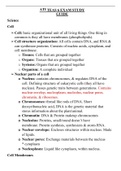
-
ATI TEAS 6 EXAM STUDY GUIDE
- Other • 30 pages • 2021
-
- $16.49
- + learn more
ATI TEAS 6 EXAM STUDY GUIDE Science Cell Cell: basic organizational unit of all living things. One thing in common is they all have membranes (phospholipids). Cell structure organization: All cells contain DNA, and RNA & can synthesize proteins. Consists of nucleic acids, cytoplasm, and cell membrane. o Tissues: Cells that are grouped together o Organs: Tissues that are grouped together o Systems: Organs that are grouped together o Organism: A complete individual Nuclear parts of a c...
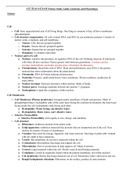
-
ATI TEAS 6 EXAM S cience Study Guide (Anatomy and Physiology)
- Other • 18 pages • 2021
-
- $14.49
- + learn more
ATI TEAS 6 EXAM S cience Study Guide (Anatomy and Physiology). Science Cell Cell: basic organizational unit of all living things. One thing in common is they all have membranes (phospholipids). Cell structure organization: All cells contain DNA, and RNA & can synthesize proteins. Consists of nucleic acids, cytoplasm, and cell membrane. o Tissues: Cells that are grouped together o Organs: Tissues that are grouped together o Systems: Organs that are grouped together o Organism: A...
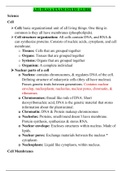
-
ATI TEAS 6 EXAM STUDY GUIDE_Science|Biology (complete Solution) Fall 2020.
- Study guide • 27 pages • 2020
- Available in package deal
-
- $13.49
- + learn more
ATI TEAS 6 EXAM STUDY GUIDE_Science|Biology (complete Solution) Fall 2020. ATI TEAS 6 EXAM STUDY GUIDE Science Cell Cell: basic organizational unit of all living things. One thing in common is they all have membranes (phospholipids). Cell structure organization: All cells contain DNA, and RNA & can synthesize proteins. Consists of nucleic acids, cytoplasm, and cell membrane. o Tissues: Cells that are grouped together o Organs: Tissues that are grouped together o Systems: Organs that a...

-
HESI A2 ANATOMY AND PHYSIOLOGY-CHRISJAY FILES
- Exam (elaborations) • 83 pages • 2022
-
- $57.99
- + learn more
ANATOMY AND PHYSIOLOGY A&P FILES ANATOMY AND PHYSIOLOGY 1. Skin responsible for finger prints? Dermal papillase Markel cells Amectors pili Sudoriferous gland 2. What type of synovia joint is the elbow? Pivot Hinge Ball and socket Toddle 3. Where is blood produced in infants after birth? Heart chamber Red bone marrow 4. What structure is a ball and socket joint? Elbow Ankle Shoulder Knee 5. What are macromolecules genetic code carried on? Nucleotide Chromosomes DNA RNA 6. What cavity...

-
HESI A2 ANATOMY AND PHYSIOLOGY-CHRISJAY FILES
- Exam (elaborations) • 83 pages • 2022
-
- $57.99
- + learn more
ANATOMY AND PHYSIOLOGY A&P FILES ANATOMY AND PHYSIOLOGY 1. Skin responsible for finger prints? Dermal papillase Markel cells Amectors pili Sudoriferous gland 2. What type of synovia joint is the elbow? Pivot Hinge Ball and socket Toddle 3. Where is blood produced in infants after birth? Heart chamber Red bone marrow 4. What structure is a ball and socket joint? Elbow Ankle Shoulder Knee 5. What are macromolecules genetic code carried on? Nucleotide Chromosomes DNA RNA 6. What cavity...

-
ANATOMY AND PHYSIOLOGY
- Exam (elaborations) • 82 pages • 2022
-
- $118.49
- + learn more
A&P FILES ANATOMY AND PHYSIOLOGY 1. Skin responsible for finger prints? Dermal papillase Markel cells Amectors pili Sudoriferous gland 2. What type of synovia joint is the elbow? Pivot Hinge Ball and socket Toddle 3. Where is blood produced in infants after birth? Heart chamber Red bone marrow 4. What structure is a ball and socket joint? Elbow Ankle Shoulder Knee 5. What are macromolecules genetic code carried on? Nucleotide Chromosomes DNA RNA 6. What cavity of heart has the thicke...

How did he do that? By selling his study resources on Stuvia. Try it yourself! Discover all about earning on Stuvia


